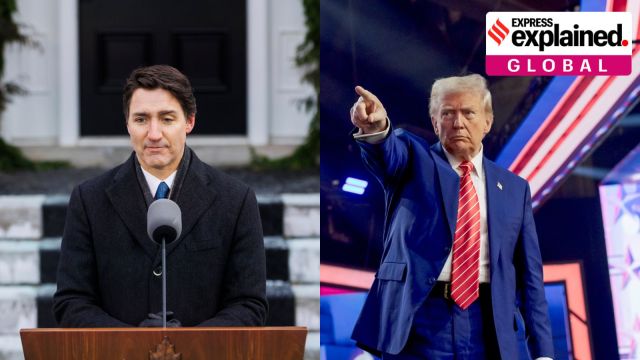When Canadian Prime Minister Justin Trudeau announced his resignation Monday (January 6), US President-elect Donald Trump responded with an offer of his own: For Canada to merge with the United States.
Trump’s post on the social media platform Truth Social read: “Many people in Canada LOVE being the 51st State… If Canada merged with the U.S., there would be no Tariffs, taxes would go way down, and they would be TOTALLY SECURE from the threat of the Russian and Chinese Ships that are constantly surrounding them. Together, what a great Nation it would be!!!”

This wasn’t the first time Trump made these remarks. The President-elect previously poked fun at Trudeau, calling him “Governor Justin Trudeau of the Great State of Canada” in a social media post on December 10, shortly after a dinner between the two leaders at Trump’s Mar-a-Lago estate in Florida.
Story continues below this ad
What’s behind Trump’s ’51st state’ jibe?
According to a Fox News report which cited insiders, the banter started at the Mar-a-Lago dinner on November 29. The dinner followed a threat from Trump about a blanket tariff of 25% on all goods from Canada – and Mexico – if they don’t do enough to stop illegal migration and the flow of drugs across the border.
However, Trump’s threats violate the United States-Mexico-Canada Agreement (USMCA), which came into effect on July 1, 2020. It regulates the largely duty-free trade between the three countries and replaced the earlier North American Free Trade Agreement (NAFTA).
Moreover, the tariffs would be damaging to Canada’s economy, which relies heavily on its trade with the US. Trump has long expressed his desire to eliminate the around $40 billion US trade deficit with Canada. Experts have attributed this imbalance to Canada’s oil exports.
At the November 29 dinner, Trump reportedly said that if Canada cannot meet US demands, it should become the “51st state” and Trudeau its Governor. The banter reportedly elicited “nervous laughter” from the Canadian camp, the Fox News report said.
Story continues below this ad
Trump followed up the repartee with a picture on Instagram, where he’s seen standing on mountains next to the Canadian flag. His son Eric Trump shared a meme showing the President-elect “buying” Canada, Greenland and Panama Canal off Amazon.
Canadians, however, weren’t impressed. Many have dismissed Trump’s statements as jokes, while others called it an insult to the country.
Downplaying Trump’s remarks, Canada’s Public Safety Minister Dominic LeBlanc, who was at the Mar-a-Lago dinner, said the President-elect was “telling jokes” and “teasing us”.
Would Canadians want a merger with the US?
Canadians have historically resisted attempts at annexation by the United States. The Canadian federation was birthed from the threat of an American invasion, with the province of Canada (present-day Ontario and Quebec) coming together with New Brunswick and Nova Scotia in 1867.
Story continues below this ad
The US had previously tried to invade Canadian territory, which was then a set of divided British colonies. After declaring independence from the British in 1776, there was a rise in proponents of “Manifest Destiny” — which represented the idea that it was America’s right (or destiny) to expand across the whole of North America. However, the British forces prevailed in the War of 1812, and the war itself contributed to a growing sense of national identity.
The threats of expansionism died down after the Canadian Confederation was formed. However, efforts to cosy up to the Americans were met with resistance from the Canadian public for the longest time. Prime Minister Wilfrid Laurier’s attempt to strike a “reciprocity agreement” on tariffs with the US in 1910 was poorly received and led to his defeat in the election a year later, ending his 15-year regime.
PM Brian Mulroney’s efforts in the 1980s to establish a Free Trade Agreement (FTA) with the US bore fruit, though not without opposition. Mulroney thus declared elections in 1988, won and finally signed the FTA that came into effect in 1989.
In recent times, the few calls to merge Canada with the United States have found little footing among the public. A survey done by Leger, a Canadian market research and analytics company, in December 2024 found that only 13% of the 1,520 respondents said that they would like Canada to become the 51st state of the United States. An overwhelming 82% said they would not like the idea.
Story continues below this ad
If Canada were to merge with the US…
In 2014, the think tank Woodrow Wilson Center deliberated on what would happen if Canada were to merge with the US. The discussion was held after a book written by conservative journalist Diane Francis was released, advocating for the union. She argued that if Canada and the US were to merge, “the countries would become an energy and economic powerhouse, occupying more land than Russia or the continent of South America.”
At the discussion, Francis said the book was meant to draw attention to a more serious discussion on the economic integration of the two countries. The expert panel concluded that the Americans and Canadians should draw inspiration from the European Union framework over “enhanced cooperation”.
In an article for The Conversation, Carleton University professor Aaron Ettinger said that establishing the 51st state of Canada was not in Trump’s best interests. “Republicans would never win an election again… the “state of Canada” would profoundly alter the electoral map of American national politics, almost entirely in the Democratic Party’s favour,” he wrote.








































